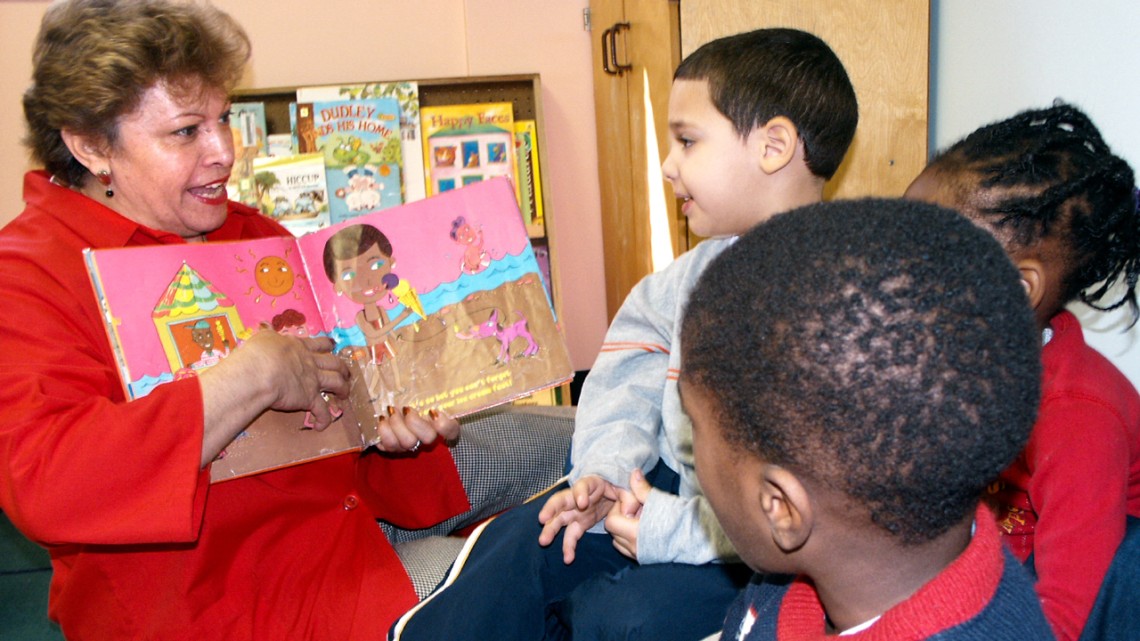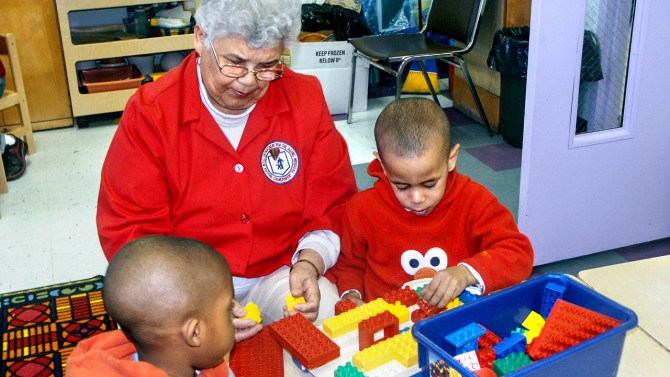
Cornell Cooperative Extension’s partnership with New York City’s Department for the Aging will help provide child development training to volunteers like this one in the department’s Foster Grandparent Program.
Older volunteers help NYC children grow, learn through play
By James Dean
When pandemic conditions permit her return to a Manhattan kindergarten classroom, 72-year-old volunteer Brenda McGee is eager to practice child development strategies highlighted in recent virtual training presented by Cornell University Cooperative Extension-New York City (CUCE-NYC).
If the 5- and 6-year-olds are playing with puzzles or blocks, McGee, a volunteer in the New York City Department for the Aging’s Foster Grandparent Program, won’t simply make sure they’re playing safely or tell them what to do. Instead, she’ll pose open-ended questions to encourage experimentation and the use of spatial language (above, below, between) that researchers say creates a foundation for learning science, technology, engineering and math.
“Children learn language through play,” said McGee, a retired educator and Bronx resident. “Everything in our training I can really use when I get back to the classroom.”
McGee is one of more than 50 Foster Grandparent volunteers, ranging in age from 60 to 86, who completed the “Growing and Learning Together Through Play” curriculum led by Ana M. Cañas, CUCE-NYC parenting education/early child development specialist, and based on research by Marianella Casasola, professor of psychology in the College of Human Ecology, who participated as a guest speaker.
Started almost by chance, the training collaboration between CUCE-NYC and the city Department for the Aging developed into a “massive success,” said Sapir Ashkenazi, director of the Foster Grandparent Program, including training for cohorts of Cantonese and Mandarin speakers supported by a translator. As word spread, a waitlist quickly grew.
That led to a three-year memorandum of understanding that will enable the nation’s largest Foster Grandparent Program to continue training its more than 260 volunteers in-house. The volunteers will complete surveys and assessments to help CUCE-NYC evaluate the program’s impact on the special- and exceptional-needs children they serve.
“We’ve gotten so much positive feedback,” Ashkenazi said. “We want to ensure that all of our Foster Grandparent volunteers are trained on these skills that will not only help them, but have a positive, lasting effect on the children they’re working with.”
“This partnership has been very meaningful,” Cañas said. “When there’s this type of collaboration across sectors, there’s an opportunity to make a greater impact.”
It started with Ashkenazi researching new partnerships for virtual opportunities to engage volunteers sidelined by the pandemic, unable to visit the preschools, day care centers, elementary schools, after-school programs, courts and hospitals where they had worked 15 to 40 hours a week.
A blind query sent through the national 4-H website made its way to CUCE-NYC Executive Director Jennifer Tiffany, who responded and saw the potential fit of Growing and Learning Together Through Play.
Originally developed for parents and caregivers of 2- to 5-year-olds – years when much of a child’s brain development occurs – Cañas agreed to adapt the program for non-caregivers and scale it up for a larger audience.
The ensuing eight-week series of two-hour workshops was many Foster Grandparents’ first time participating in virtual meetings over Zoom – on tablets provided by the city – and their most intensive experience fulfilling annual training requirements.
Cañas said she sought to facilitate group discussions and reflections about what works or doesn’t at the Foster Grandparents’ volunteer stations, incorporating their experiences and voices, sometimes through role-playing exercises.
Workshop topics included the importance of play in early childhood; behavior management; screen time; tools to promote language development and spatial skills; and play’s link to STEM learning.
“Introducing STEM to children at such an early age was really eye-opening to some Foster Grandparents, as well as myself,” said Caroldine Smith, a program manager who will lead the Foster Grandparent Program’s in-house training moving forward, with support from CUCE-NYC.
In addition, Smith said, the Foster Grandparents learned to be more patient and active listeners, to use praise and encouragement, that there are no wrong answers, and “to encourage children to pretend, to dream, to try and not to give up.”
Although most Foster Grandparents almost by definition have considerable experience with children, as McGee noted, “the children haven’t changed, but the way we teach them and the tools we use do change.”
Brooklyn resident Xiao Qi Lao, 75, a Cantonese-speaking participant who volunteers at a Coney Island preschool, said the training helped her better understand the reasons behind certain behavior by children, and opportunities to support learning through play. For example, she said, a sandbox disagreement could help children develop the language to negotiate, share and control their emotions.
“Through this training, we’ve opened our eyes to see things more clearly,” Lao said through a translator, Cambao De Duong, a Foster Grandparent Program field coordinator.
Lao is grateful that more of her fellow Foster Grandparents will receive the same opportunity through the program’s ongoing partnership with CUCE-NYC.
The Growing and Learning Together Through Play collaboration is supported by a gift from the Michael W.N. ’66 and Shirley N. Chiu Literacy Program, as well as U.S. Department of Agriculture National Institute of Food and Agriculture Smith-Lever grant funding through Cornell Cooperative Extension.
Get Cornell news delivered right to your inbox.
Subscribe


